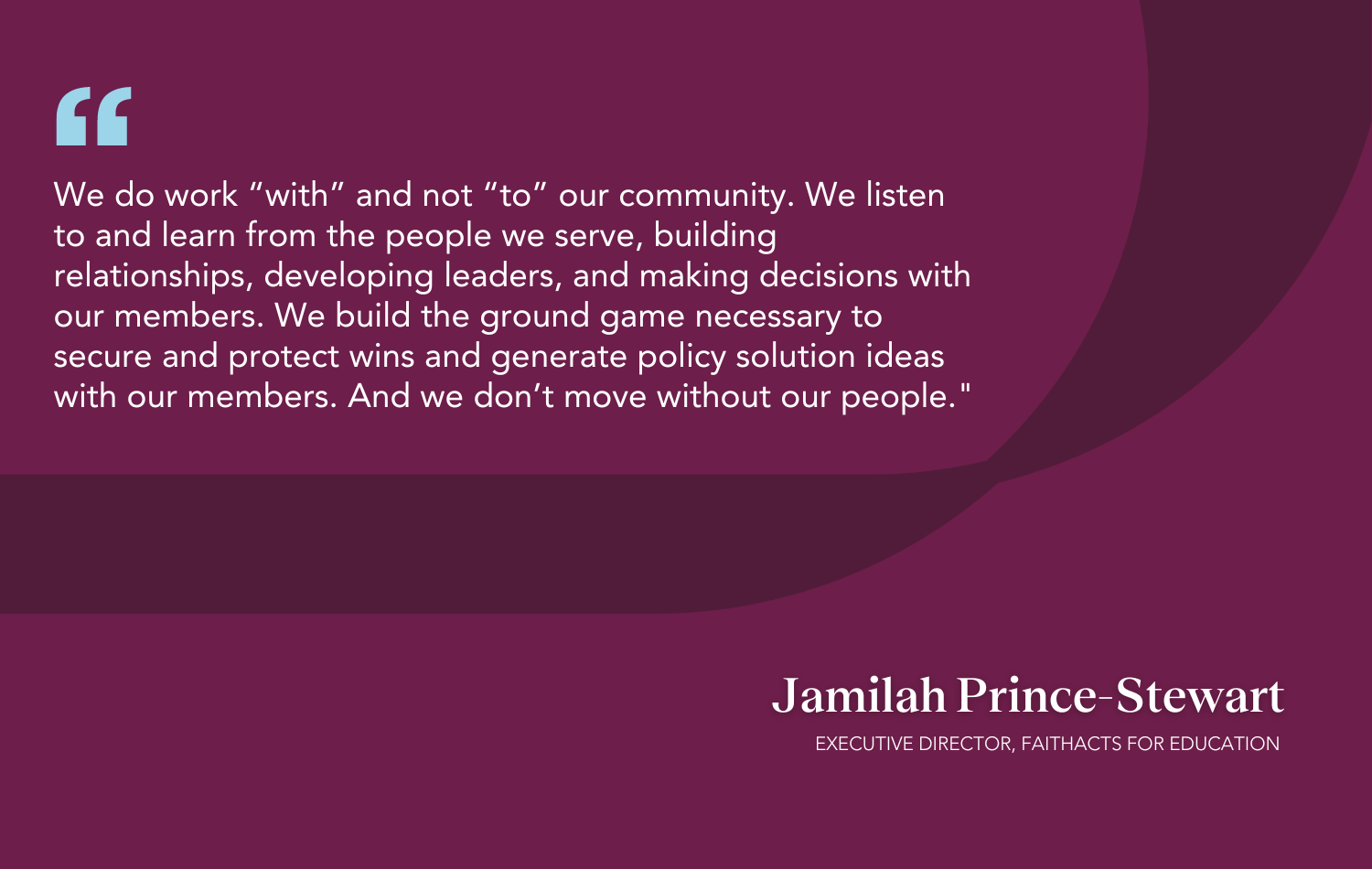Too often in school systems across the country, parents are left out of decision-making — particularly those who are low income, first-generation, immigrants, and/or Black, Latino, or Native American. They aren’t in the room where decisions are made about policy and funding. Frequently, they aren’t even invited into the building.
In this Q&A series, hear reflections from leaders at effective parent power organizations across the country who do this work every day, in their own words. To learn more about Building Parent Power, click here, and join us in an upcoming webinar series.
Jamilah Prince-Stewart co-founded FaithActs for Education in 2014 and is its executive director. (Note: Responses edited for clarity and length.)
Krista Kaput and Kelly Robson Foster: What are the two to three key practices that FaithActs for Education (FaithActs) uses to ensure parents are centered in organizing and decision-making?
Jamilah Prince-Stewart:
We do work “with” and not “to” our community. We listen to and learn from the people we serve, building relationships, developing leaders, and making decisions with our members. We build the ground game necessary to secure and protect wins and generate policy solution ideas with our members. And we don’t move without our people. We win together because we don’t tell people what they care about most — we create campaigns around issues they voice concerns over and are willing to sacrifice for. We develop leaders who can guide change in our communities.
Q:
What has FaithActs accomplished that you’re most proud of?
JPS:
We imagined an organization, created it with people in our community, and we exist and thrive eight years later. That’s not common in Connecticut or across our country. And because of our work together, we secured one of the biggest education wins in the past decade: We ended this 2022-23 legislative session with a historic $150 million budget increase for our children’s education, moving our schools closer to equity for all children. This includes a monumental, multi-million dollar victory for our public schools in Bridgeport, Hartford, and New Haven. As the Connecticut Mirror reported, “One of the biggest winners in the new budget is local school districts.” The budget also includes a needed $15 million increase for public charter schools, which educate primarily Black and brown students, and funding for two new Black-led public charter schools.
We won this victory because of the power of our people. Because of our work, communities now have the resources and opportunity to imagine what’s possible for their children.
Q:
What is FaithActs’ “secret sauce”? What are a few of the key reasons FaithActs has been successful?
JPS:
We succeed because we know that faith manifests in activism. We are the only organization in Connecticut, and one of a handful nationally, with a model of faith-based community organizing and civic engagement. We have unprecedented access to places of worship, the bedrock of many Black communities. And we have harnessed the power of people of faith to demand revolutionary change for our kids and our communities.
Q:
Looking ahead, where do you see FaithActs in the next five years and what do you hope to accomplish?
JPS:
As Frederick Douglass said, “power concedes nothing without a demand.” We built FaithActs to equip our people — thousands of congregants across 100 predominantly Black churches in Connecticut — to make demands that leadership must abide by. And we are continuing to build the power to demand that Connecticut stops punishing our children for their ZIP code, relegating them to underfunded schools that lack the resources that we know students need to reach their full potential.
In the next five years, through our work in and around Connecticut’s three largest and highest-need cities of Bridgeport, Hartford, and New Haven, we will demand and catalyze bigger steps toward creating a state where education equity is a reality for all children. We will grow our engaged voter base to 10,000 committed voters who will help to hold our elected officials accountable. And we will share what we have learned across our growing FaithActs Organizing Institute cohort and with others who would partner in this work, both near and far.
